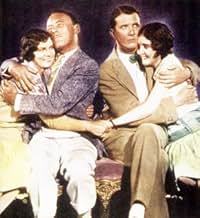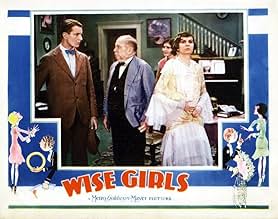Ajouter une intrigue dans votre langueThe father of three grown daughters tries to keep his sanity, even after his free-spirited middle daughter rebelliously marries a poor plumber.The father of three grown daughters tries to keep his sanity, even after his free-spirited middle daughter rebelliously marries a poor plumber.The father of three grown daughters tries to keep his sanity, even after his free-spirited middle daughter rebelliously marries a poor plumber.
- Réalisation
- Scénario
- Casting principal
Avis à la une
Roland Young is pretty good as the other man in this comedy about a woman who marries the plumber and causes all sorts of fuss. It's based on the stage play "Kempy" by Elliot Nugent and his father, J.C. Nugent, and stars them.
Unfortunately, director E. Mason Hopper is constrained by the immobility of the camera and everyone speaks slowly so their words can be understood, so Roland Young's comic timing has problems. It's he who has the task of speeding up the thought processes of Elliot Nugent. Marion Shilling, who usually played pieces of fluff, is stiff as a board. In fact, everyone but Young is, which pretty much explains what happened to everyone's career. The younger Nugent became a respected writer and director, but not off this. It would require top-ranked actors to make this sort of dialogue flow.
This is supposed to be the first MGM talkie issued without a silent version. Considering how much dialogue there is, it's not surprising. Alas, the dialogue is not very good.
Unfortunately, director E. Mason Hopper is constrained by the immobility of the camera and everyone speaks slowly so their words can be understood, so Roland Young's comic timing has problems. It's he who has the task of speeding up the thought processes of Elliot Nugent. Marion Shilling, who usually played pieces of fluff, is stiff as a board. In fact, everyone but Young is, which pretty much explains what happened to everyone's career. The younger Nugent became a respected writer and director, but not off this. It would require top-ranked actors to make this sort of dialogue flow.
This is supposed to be the first MGM talkie issued without a silent version. Considering how much dialogue there is, it's not surprising. Alas, the dialogue is not very good.
10ejlundin
I needed something that expressed true, non-profanity and overly banal used laughs. I didn't expect it but this movie had me on a Rodney Dangerfield type, unexpected belly laughs. True wit and timing. Loved it.
Was able to catch this Gem on a TCM airing recently and found it to be a wonderful comedy. Stopped by here to learn if the Nugent authors were related. The dramatic hyperbole is part of the comedy, not to be critiqued as poor acting, but enjoyed like reruns of Dark Shadows with all the notorious set flaws.
A talkie borne out of the silents, sans bad makeup, the dialog is intentionally over expressive, but the script is heartfelt small town Americana, and the casting is wonderfully touched.
My favorite is the bewildered and berated "king of his castle" Dad, besieged by 4 women in his life... Ma, the older married daughter next door, the naivete "artiste du wannabe" Kay, and the youngest budding collegian Ruth.
An overall excellent run around of 30's family values with many little lessons mixed into the porridge.
Hope to find this teams other creation and be able to be similarly entertained.
Hope to find this teams other creation and be able to be similarly entertained.
I have to take my hat off to MGM. They preserved almost all of their film history including this film which could only have been a B effort in its day. It shows none of the polish that MGM gave its A list early talking efforts that same year and has no stars or director of note except Roland Young, and he was just starting out in films in 1929 after years of having been a stage actor.
J.C. Nugent (Dad, or Mr. Bence) is a retired businessman who appears to be in his mid to late 50's. He has a nice but not super elegant house, and he has two single spendthrift daughters. This is driving Dad crazy because he retired only with one hundred thousand dollars - I'm going to guess that's worth between one and two million today - and it has to last him the remainder of his life. One daughter, Ruth, appears to be level headed beyond all of the spending. Kate, however, has delusions of grandeur of making it big in the art world on top of everything else. She got her book published only because her wealthy beau secretly pulled some strings, and now she wants to tackle musical comedy. This gets on the last nerve of her beau (Roland Young as Duke Merrill) because he wants her to settle down and for them to be married, and the two quarrel.
The first person Kate meets after the quarrel is Kempy (Ed Nugent), an indigent young man who is a plumber by day and architect by night. He tells her that her book changed his life and that he always promised himself if he met the author he would marry her. Kate is angry, Kempy is easily led, and off they go to the justice of the peace. Now when Kate phones home and tells her family she is a married woman, they assume she married Duke. This is great news for Dad, since back in the 20's single girls lived at home until they married, and Duke will be a good provider. When the couple returns home and her parents see who Kate's husband really is, all tarnation - and Dad's blood pressure - break loose.
The problem is, Kate really got married to get back at Duke, Kempy got married because he is easily led and seems to be just a little afraid of Kate, and sister Ruth and Kempy are starting to find that they have much in common besides Kate. Comic complications ensue.
Shave about a half hour off of this film and it would have been a nicely paced comedy, almost a screwball comedy foreshadowing those great Jean Arthur vehicles of ten years later. Up to the time Kate gets married the film moves along nicely. After the wedding, the film drags frightfully to its conclusion so that it is real work just to stick with it to the end in spite of its many humorous scenes and situations.
As for the Archie Bunker comparison I made with "Dad" Bence in the title of this review, it mainly has to do with his attitude towards his new son-in-law and the prospect of supporting him on top of everyone else and how he takes for granted his long-suffering wife (Clara Blandick). There is no social commentary going on here other than this film taking an interesting peek into what was probably a typical middle class home in the 1920's. I'd recommend it for that "interesting peek" and from the film history angle if nothing else.
J.C. Nugent (Dad, or Mr. Bence) is a retired businessman who appears to be in his mid to late 50's. He has a nice but not super elegant house, and he has two single spendthrift daughters. This is driving Dad crazy because he retired only with one hundred thousand dollars - I'm going to guess that's worth between one and two million today - and it has to last him the remainder of his life. One daughter, Ruth, appears to be level headed beyond all of the spending. Kate, however, has delusions of grandeur of making it big in the art world on top of everything else. She got her book published only because her wealthy beau secretly pulled some strings, and now she wants to tackle musical comedy. This gets on the last nerve of her beau (Roland Young as Duke Merrill) because he wants her to settle down and for them to be married, and the two quarrel.
The first person Kate meets after the quarrel is Kempy (Ed Nugent), an indigent young man who is a plumber by day and architect by night. He tells her that her book changed his life and that he always promised himself if he met the author he would marry her. Kate is angry, Kempy is easily led, and off they go to the justice of the peace. Now when Kate phones home and tells her family she is a married woman, they assume she married Duke. This is great news for Dad, since back in the 20's single girls lived at home until they married, and Duke will be a good provider. When the couple returns home and her parents see who Kate's husband really is, all tarnation - and Dad's blood pressure - break loose.
The problem is, Kate really got married to get back at Duke, Kempy got married because he is easily led and seems to be just a little afraid of Kate, and sister Ruth and Kempy are starting to find that they have much in common besides Kate. Comic complications ensue.
Shave about a half hour off of this film and it would have been a nicely paced comedy, almost a screwball comedy foreshadowing those great Jean Arthur vehicles of ten years later. Up to the time Kate gets married the film moves along nicely. After the wedding, the film drags frightfully to its conclusion so that it is real work just to stick with it to the end in spite of its many humorous scenes and situations.
As for the Archie Bunker comparison I made with "Dad" Bence in the title of this review, it mainly has to do with his attitude towards his new son-in-law and the prospect of supporting him on top of everyone else and how he takes for granted his long-suffering wife (Clara Blandick). There is no social commentary going on here other than this film taking an interesting peek into what was probably a typical middle class home in the 1920's. I'd recommend it for that "interesting peek" and from the film history angle if nothing else.
An early MGM talkie, and how it shows, with awkward pauses, static camera-work, and technical glitches aplenty--at least twice, the camera focuses on a doorway for a full 15 seconds, just waiting for an entrance. It's a Broadway play, a not particularly successful one, written by and starring Nugent pere et fils, who had also done it on stage. The elder Nugent is an irascible paterfamilias in suburban New Jersey, and the younger is a plumber/architect wooing and marrying his flighty daughter, all the while loving the other daughter. It's stagy and slowish, but that's part of its charm--I felt like I was really watching a vintage 1920s romantic comedy as presented on stage, more or less. It's barely opened up, with few exteriors, but the cast is game, and Roland Young, as a deservedly spurned suitor, is already a master of the form. Not worth going out of your way to see, but if it turns up on TCM, and it does sometimes, it's a diverting hour-and-change.
Le saviez-vous
- AnecdotesKate states she spent $1,100 on dresses in New York City. That amount would equate to over $16,250 in 2019.
- Citations
Ruth Bence: Kiss me, Kate!
- ConnexionsFeatured in We Haven't Really Met Properly...: Clara Blandick as Auntie Em (2005)
Meilleurs choix
Connectez-vous pour évaluer et suivre la liste de favoris afin de recevoir des recommandations personnalisées
Détails
- Durée
- 1h 37min(97 min)
- Couleur
- Rapport de forme
- 1.20 : 1
Contribuer à cette page
Suggérer une modification ou ajouter du contenu manquant





















